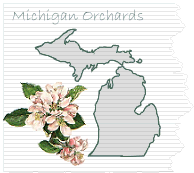Michigan Orchards
Cider Mill Listings
more information
Welcome to Michigan's apple orchards. Choose your area from the list on the left to find an orchard near you. The orchards are organized by the major urban areas they are near. Michigan is the leading state in the country for retail orchard fruit sales, and is world famous for the quality and flavor of its apples. As always, it is advisable to call ahead before making a trip. Remember, these are working farms subject to the nuances of the weather and other crop conditions.
Michigan Apple Industry Overview
from the Michigan Apple Committee:
The Michigan apple industry is dominated by small family farmers operating their own orchards. Michigan ranks third, or occasionally second, among states for apple production, behind Washington and New York. Michigan leads the nation in number of fruitstands and farm markets, and is famous for the flavor of its "northern-grown" fruit.
The first official Michigan apple statistics were compiled in 1889. Production that year was 13.16 million bushels. Most crops in the following years were less than 9 million bushels until 22.99 million bushels were produced in 1896 to set a record that stood until 1982. In 1897 devastating frosts reduced the crop to only 3.78 million bushels. A similar situation occurred in 1945 after abnormally warm temperatures in late March. The crop of 1.25 million bushels that year was the lowest since records have been kept.
The most recent Michigan Agricultural Statistics Service (MASS) census of Michigan's apple producers was conducted in 1997. At that time the state had 1,100 apple farms, a decline of 12.7 percent from 1994 and 27.4 percent from 1986. The farms totaled 57,000 acres in 1994, down from the 58,000 acres of 1994 and 1991 and from the 61,700 acres of 1986. The number of trees has continued to rise sharply, however, from 5.8 million in 1986 to 6.8 million in 1991 to 7.8 million in 1994 and 8.85 million in 1997. The figures reflect the strong trend toward smaller, more closely planted trees.
Red Delicious is the leading variety in Michigan with 2.065 million trees, or 23.3 percent of the 8.85 million total, based on the 1997 MASS census. Golden Delicious is second in tree numbers at 1.07 million, followed by Jonathan at 760,000. Empire moved up in the rankings since 1994, coming in at 640,000 in 1997. Next are Rome at 635,000 and Ida Red at 580,000. A newcomer, Gala, came on fast to take the next position at 570,000. McIntosh is next at 505,000. Another new comer, Jonagold, has 425,000 trees, followed by Northern Spy at 385,000. Fuji accounts for 200,000 trees.
The Gala total increased 90 percent above that of the 1994 survey, while Jonagold soared 49 percent. Other varieties with increases include Golden Delicious (28.1 percent), Northern Spy (10 percent), Red Delicious (8.7 percent) and Empire (3.2 percent). Jonathan declined by 1.3 percent, Ida Red by 3.3 percent, McIntosh by 3.8 percent and Rome by 6.6 percent.
The most heavily planted variety in 1997 was Gala, with 161,000 new trees added. Plantings of Red Delicious that year totaled 100,400 and Golden Delicious 78,200, followed by Jonagold at 42,300. Michigan's growers have targeted solid markets in the long-popular Red Delicious and Golden Delicious and in two newer varieties that are in a strong upswing in consumer demand, Gala and Jonagold.
Well over half of Michigan's apple production is sold to processors, who transform raw apples into many forms, including sauce, juice and slices for pies. Sauces are often blends of several varieties, just as juice and fresh apple cider are. Makers of frozen pies need firm, tasty varieties that hold up well during baking. Their preferences include Northern Spy, Jonathan and Ida Red. Michigan is the nation's leading supplier of apples for the large frozen-pie market.
Michigan apples can end up anywhere in the nation in processed form. Transportation costs are a factor in any distribution pattern, of course, and limit Michigan's fresh apples to distribution predominately east of the Rockies. Michigan apples are familiar sights in supermarket produce departments throughout the Midwest and much of the South, where they have strong penetration especially into Florida and Texas. Memphis, Nashville, Birmingham and Louisville are also major outlets for Michigan apples. Overseas Michigan's fresh apples are big sellers in the United Kingdom, which has developed a taste for the Empire variety. The Caribbean is another significant foreign market, and the recent opening of Brazil to U.S. apples has expanded the reach of Michigan apples overseas.
Sources: USDA; Michigan Agricultural Statistics Service Reports.



